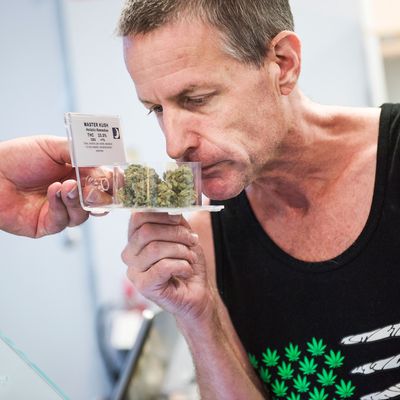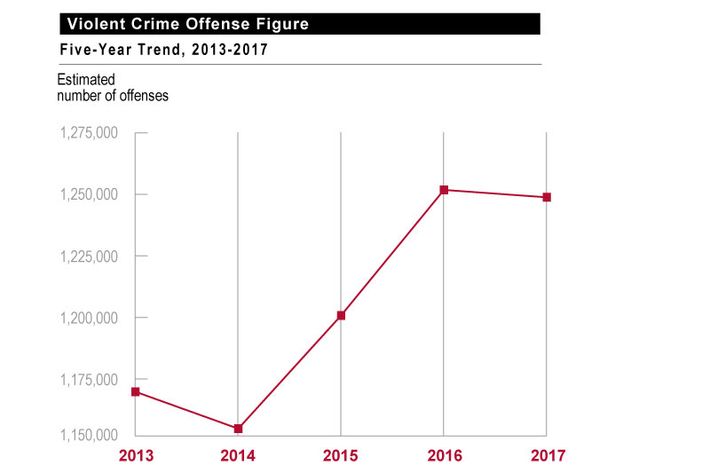
A few days ago, a New York Times op-ed by Alex Berenson, the author of the forthcoming book Tell Your Children: The Truth About Marijuana, Mental Illness, and Violence, made a startling claim about marijuana legalization, a policy that, as he notes, “seems to be on an unstoppable march […] in the United States” in light of both national polling on the issue and the many recent, liberalizing changes to state pot laws:
[B]ecause marijuana can cause paranoia and psychosis, and those conditions are closely linked to violence[,] it appears to lead to an increase in violent crime. Before recreational legalization began in 2014, advocates promised that it would reduce violent crime. But the first four states to legalize — Alaska, Colorado, Oregon and Washington — have seen sharp increases in murders and aggravated assaults since 2014, according to reports from the Federal Bureau of Investigation. Police reports and news articles show a clear link to cannabis in many cases.
Let’s set aside the idea that legalizing marijuana will reduce violent crime: violent crime is unpredictable and this is probably too optimistic a claim to pin to any one change in the law not geared directly at crime reduction (though it’s not crazy to imagine that obviating black markets might reduce crime in certain instances). Berenson isn’t just expressing skepticism of that claim — he’s arguing, in strong language, that legalization has done the opposite. And if, in fact, there were a tight, clearly illustrated link between cannabis legalization and increases in violent crime, that would certainly be an important bit of evidence to consider as legalization continues. But Berenson doesn’t come close to showing this. Rather, this paragraph is a case study in how to misleadingly use statistics to make oversimplified arguments about human behavior and public policy.
At root, Berenson’s fishiest move is his choice of 2014 as a baseline year. “Nothing interesting happened with regard to pot in 2014,” said Mark Kleiman, a drug expert and public-policy professor at NYU who has himself urged caution over marijuana-legalization Pollyannaish-ness, in an email, “but there was a national uptick in homicide in 2015–2016.”
Kleiman’s right on both fronts. First, here’s a graph of the FBI’s nationwide violent-crime stats from recent years, which show an uptick in violent crime after a long general period of general decline:

(I couldn’t find a good graph with the per-100,000-residents numbers rather than the raw ones, but those stats follow the same up, up, down-a-bit pattern from 2014 to 2017.)
Plenty of states, carried along by the nationwide trend, saw increases in violent crime, whatever their pot laws. And as Kleiman noted, there’s no reason to pick 2014 as a year for examining the four states in question. While Alaska and Oregon did officially legalize marijuana then, Colorado and Washington did so in 2012. And state pot-law histories tend to be more complicated than the dates of full legalization, anyway — in Alaska and Oregon (see the previous links), it’s been decades since having small to moderate amounts of marijuana for personal use could lead to anything worse than a small fine. The idea that a state flipping over from a very liberal pot policy to a very liberal pot policy would lead to an immediate uptick in violent crime demands evidence that’s absent from Berenson’s column.
Plus, zooming in on some of these crime stats tells a more complicated story, anyway. Despite Berenson’s claim of “sharp increases in murders and aggravated assaults since 2014” in Oregon, for example, the FBI reported that the murder rate there went up a grand total of 1.0 percent from 2015 to 2016, as compared to a nationwide uptick of 7.9 percent, and then dropped by 11.6 percent between 2016 and 2017, a significantly steeper drop than in the rest of the country. If one insists on positing a tight causal relationship between pot laws and murder rates, one could just as easily argue that Oregon’s homicide trajectory has been softened by pot legalization in these years, at least relative to national trends, saving a number of Oregonians’ lives. And of course, such a focus on state laws and crime rates ignores the larger picture: “Cannabis consumption, and especially heavy cannabis consumption, has been on the rise since 1992,” said Kleiman in his email. “Over that period, national homicide rates have fallen more than 50%.”
What’s frustrating about this pointlessly misleading scaremongering is that, underneath it, Berenson has a fair point, expressed elsewhere in his column: The U.S. is, in fact, in the midst of a rather radical change to its marijuana laws. In many ways, this is an important step toward justice: The war on pot has been an unmitigated catastrophe by many metrics, and it has done disproportionate damage to communities vulnerable to overpolicing. But that doesn’t mean marijuana is totally harmless, or that there aren’t important public-health questions that remain to be answered about the effects of legalization. In fact, there’s a huge amount of uncertainty on this front. As Malcolm Gladwell writes in The New Yorker, examining a mammoth National Academy of Medicine study released in 2017: “Does the use of cannabis increase the likelihood of fatal car accidents? Yes. By how much? Unclear. Does it affect motivation and cognition? Hard to say, but probably. Does it affect employment prospects? Probably. Will it impair academic achievement? Limited evidence. This goes on for pages.”
These are important questions. But the way to get people to take them seriously is, well, to take them seriously — not to revert to the over-the-top claims of the past. Berenson laments the fact that anyone who points out that marijuana legalization could have certain net-negative effects “may be mocked as a modern-day believer in ‘Reefer Madness,’ the notorious 1936 movie that portrays young people descending into insanity and violence after smoking marijuana.” But if you don’t want to be lumped in with Reefer Madness, don’t make unjustified claims about reefer!





























